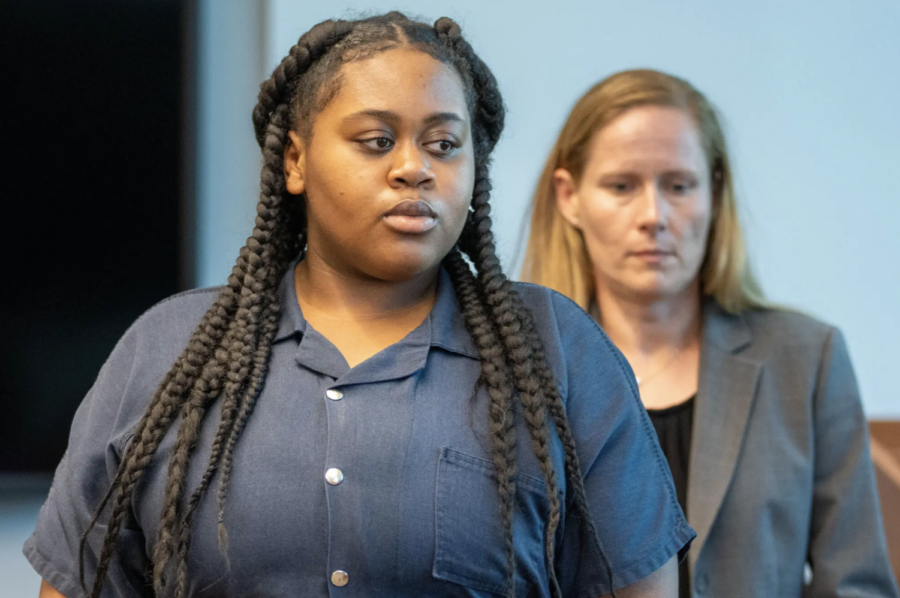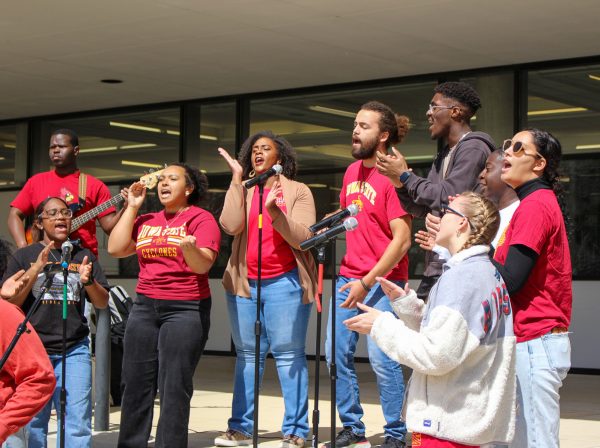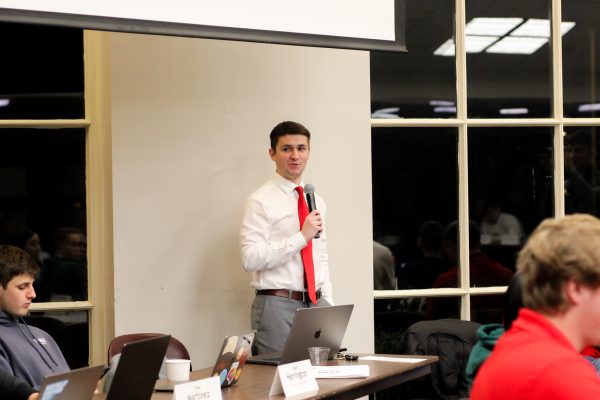‘I prevail, I am resilient’: Community rallies behind Pieper Lewis
‘Pieper does not deserve to be financially burdened for the rest of her life,’ writes Leland Schipper, her former high school teacher.
Zach Boyden-Holmes/The Register
Pieper Lewis, 17, was sentenced and made to pay $150,000 in restitution to her abuser’s family on Tuesday.
“I am a survivor,” Pieper Lewis, a teenage sex trafficking victim, said at a hearing determining if she would face 20 years in prison.
Lewis, at the age of 15, was a homeless, repeat runaway from an abusive relationship with adoptive parents in Des Moines when she was taken by a man who trafficked her for sex. Lewis stabbed one of her rapists, Zachary Brooks, a 37-year-old man, over 30 times in his apartment after he repeatedly forced himself on her June 1, 2020.
“That day, a combination of complicated actions took place, resulting in the death of a person as well as stolen innocence of a child,” Lewis said in her statement at the hearing Tuesday. “I repeat, I wish the events that took place on June 1, 2020 never occurred, but to say there is only one victim to this story is absurd.”
In June 2020, Lewis was charged with first-degree murder for the killing of Zachary Brooks and pleaded guilty to manslaughter and willful injury. Both are punishable by up to 10 years in prison.
Lewis received five years probation and a deferred judgment, a type of legal remedy where a person’s record can be expunged before completion of the sentence.
David M. Porter, a Polk County district judge, decided on deferred judgment at the hearing Tuesday. Porter ordered Lewis to serve 1,200 hours of community service, which will cover more than $4,000 in fines.
In addition, she must stay at the Fresh Start Women’s Center while she is on probation, will be subject to GPS tracking and will have to provide $150,000 in compensation to Brooks’ family.
“Ms. Lewis, part of the reason why I ask you questions about whether you can follow rules, even though you disagree with them, is that I’m here to tell you the next five years of your life will be full of rules that you will disagree with,” Porter said during the reading of the sentence.
Judge Porter’s statements about Lewis’s ability to follow the rules were in reference to the guidelines of the sentencing, which means the 20-year prison sentence has been deferred under the condition that Lewis follows the rules of her probation. If Lewis were to violate the guidelines of her probation, she would be sent to prison for the 20-year term.
“I will say, some of the language the judge used, I found problematic,” Alissa Stoehr, a sociology and women’s and gender department professor, said. “Talking about the choices she made, well l, were they really her choices? Also, ‘this is her last chance.’ No one wakes up one morning and says I’m going to be a victim or survivor of sex trafficking.”
During the hearing, Lewis shared that writing her statement gave her a sense of relief since it would mean the end of a 27-month waiting period.
Lewis spent two years, from 15 to 17, at Polk County Juvenile Detention Center, where she met with a therapist and received a GED a year ahead of her graduating class, according to Lewis’ statement.
“I do not fear the thought of further incarceration,” Lewis said in her statement during the hearing. “I fear not being able to accomplish some of my goals.”
In her statement, Lewis shared a wide range of goals she set for herself, including career and personal aspirations. Lewis wants to become a fashion and graphic designer, open up a business, ‘Pie,’ where girls like her can find acceptance, and become a counselor and juvenile justice advocate for youth. She also wants to start a family and share her story.
“She’s done everything she’s supposed to, she has money now, so she can get her life back on track, start her business, all of these things because people believed in her,” Stoehr said. “Her high school teacher was the one who started the GoFundMe page.”
Leland Schipper, Lewis’s former high school teacher, began a GoFundMe page in hopes of gathering donations to cover the $150,000 in restitution Lewis is required to pay the family of her rapist.
“This law doesn’t make sense in many cases, but in this case, it‘s morally unjustifiable,” Schipper wrote, according to the GoFundMe page. “A child who was raped, under no circumstances, should owe the rapist’s family money.”
The restitution is a result of a law in Iowa that requires the court to sentence offenders, in the case their act or acts result in the death of another person, to pay at least $150,000 in restitution.
“Pieper does not owe that man’s family justice,” Schipper wrote. “Pieper does not deserve to be financially burdened for the rest of her life because the state of Iowa wrote a law that fails to give judges any discretion as to how it is applied.”
Mariam Daoud, the interim director for Advocates for Social Justice, discussed how the organization is against the systemic structures that forced Lewis to pay restitution to her rapist’s family.
“That in and of itself, [restitution] presents a lot of systemic problems that we have when it comes to how we acknowledge the trauma that victims face,” Daoud said. “Instead of criminalizing the predators as we should be, we end up criminalizing the victims more often than not.”
Stoehr shared similar views discussing how the rigidity of the law left the judge with no choice but to make Lewis pay.
“There’s no reason why she should have to pay anything to the perpetrator, but, again, it’s a state law the legislature needs to figure out and change,” Stoehr said.
More than $150,000 was raised, along with many words of support for Lewis, before noon Wednesday.
“I am overjoyed with the prospect of removing this burden from Pieper,” Schipper wrote in an update of the page.
Donations are still being accepted to pay off the $150,000 restitution and $4,000 restitution to the state and remove financial barriers for Lewis. Removing these barriers will allow her to pursue college, start a business and find ways to help other victims of sex crimes.
As of Thursday, $436,815 had been raised from more than 10,000 donors.
Lewis will have to spend five years at Fresh Start Women’s Center, a residential facility in Des Moines, where she will be subjected to a GPS tracking device.
Daoud explains that Lewis’s attorney, Matthew Sheeley, discussed finding a location Sheeley believed would have rehabilitative services that would suit Lewis, but it was not set in stone. Judge Porter eventually sided with the prosecutor’s suggestion of where Lewis should serve her five years of probation.
Judge Porter also included a tracking device as part of Lewis’s requirements due to his concerns that she would return to the lifestyle she left, according to the hearing.
“Although the women’s correctional facility does provide stability and structure, a lot of those places can be very rigid in the way that they treat their residents,” Daoud said. “I have worked closely with some similar facilities myself and, more often than not, a lot of the residents feel that it’s just another version of jail time.”
In her statement, Lewis shared that returning to society has created a conflicting feeling within her. She wants to return to comfort and normal teenage life, but people treat her differently.
“I felt, once again, isolated and abandoned,” Lewis said during the hearing. “It triggered my fight or flight, along with seeing my trafficker again. What people fail to realize is that I never got out of life, I was taken out by my circumstances. Being placed in the same environment as I was as a victim of human trafficking triggered me.”
Stoehr explains that when survivors get out of “the life,” it can bring up issues of being in the same space as the trafficker, in which case, a trafficker would have access to the survivor. Traffickers can still have the ability to come back and use force, fraud and coercion to have control.
“What I have found in talking with people in social services that are working with trafficking survivors and survivors themselves, you can get out of the situation, but you never forget it,” Stoehr said. “You’re always going to have that what-if, what-if, what-if.”
Every case is different, Stoehr said. Sometimes a survivor might not want to mention the name of a trafficker for their safety. There are times they might not know who the lead trafficker is, and sometimes a trafficker will use knowledge and experiences to keep survivors within their control.
While Lewis has and is currently facing consequences, the man who originally trafficked Lewis remains unnamed, uncharged and free.
“With the power of patience and forgiveness, provided to me by others and myself, I prevail, I am resilient,” Lewis said. “My story can change things. My story has changed me.”
Your donation will support the student journalists of the Iowa State Daily. Your contribution will allow us to purchase equipment, send our student journalists to conferences and off-set their cost of living so they can continue to do best-in-the-nation work at the Iowa State Daily.












